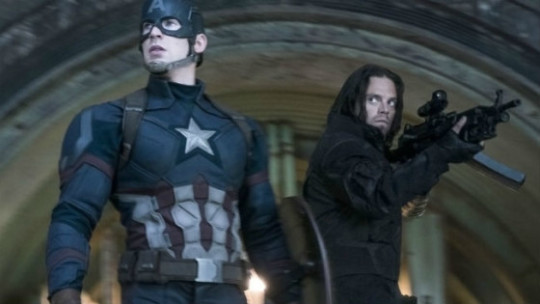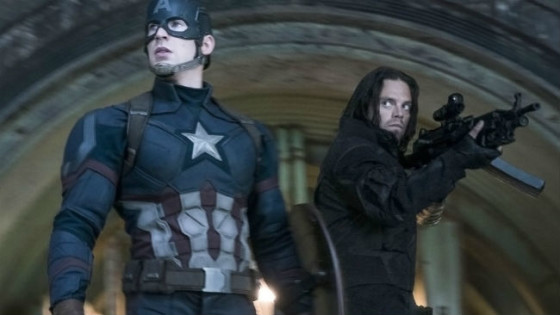Captain America: Civil War

Chris Evans as Captain America and Sebastian Stan as Bucky Barnes/The Winter Soldier in CAPTAIN AMERICA: CIVIL WAR. © Walt Disney Pictures Studios. All rights Reserved.

Patriotism is the last refuge of a scoundrel.
-Samuel Johnson, 7 April 1775
In the 1950s, as declassified documents reveal, the Central Intelligence Agency created Project MKUltra, an attempt at using conditioning/interrogation techniques in combination with psychotropics (LSD) for mind control of subjects. Uncovering moles was the Agency’s initial goal. The program had considerable participation from numerous institutions and prestigious universities and, along with the Tuskegee Experiment and radiation exposure tests on Native American subjects associated with the Manhattan Project, the operation remains one of America’s darkest spots.
Albeit a failure, MKUltra continued on through the 1970s. Its test subjects included counterculture author Ken Kesey (One Flew Over the Cuckoo’s Nest), and Ted Kaczynski—the Unabomber. Ted Kaczynski was a UC Berkeley professor until he inexplicably quit in 1969, by all accounts then a normal individual until he was subjected to a controversial study conducted by Henry Murray. Kacyznski is serving eight consecutive life sentences at a SUPERMAX prison for sixteen bombings committed between 1978 and 1995. In 2010, ten Russian sleeper agents were arrested in the United States and exchanged in a prisoner swap. The Cold War, it seems, never ended.
Following the narrative set in motion by CAPTAIN AMERICA: THE WINTER SOLDIER, its title a reference to the Winter Soldier hearings and Paine’s quote in The American Crisis, the Avengers are met with fierce criticism in the wake of collateral damage in Lagos. Wakandan aid workers in a nearby office building withstood an explosion the superheroes attempted to contain while in pursuit of a terrorist stealing a biological weapon. Wakanda, for those new to the Marvel Cinematic Universe, is a fictional African nation, home to the precious vibranium ore—also fictional, a virtually indestructible material from which Captain America’s shield is made.
Out of this catastrophe, the jurisprudence of the Avengers is questioned by Secretary of State Thaddeus Ross (William Hurt). They’re effectively under house arrest until the Sokovia Accords which will place their oversight in the hands of the United Nations. A prime suspect at the center of foul play in the signing of the Accords is Bucky Barnes (Sebastian Stan), a former instrument of the Cold War, not unlike those test subjects and sleeper agents—literally thawed out and “activated” by secret codes to assassinate targets The embers of Barnes’ friendship with Steve Rogers/Captain America ignite a rift between two camps within the Avengers—those wary of their unchecked power and those skeptical of oversight by governments easily infiltrated by HYDRA, the Nazi splinter faction corrupting nations since World War II.
Several of the characters are placed in a moral dilemma. The opening scene’s destruction comes at the hands of Wanda Maximoff, a.k.a. Scarlet Witch, an “enhanced” individual with special powers; Marvel’s extant licensing agreement with Fox bars overt use of the X-Men trademark. Wanda (Elizabeth Olsen), Vision (Paul Bettany), Hawkeye (Jeremy Renner), Falcon (Anthony Mackie; watch for a timely Mark Fuhrman reference), Black Widow (Scarlett Johansson) and other superheroes on both sides seem less cocksure of their chosen side (TEAM CAP or TEAM IRONMAN, marketing mirroring the media penchant for polarization). But the standout is Chadwick Boseman as T’Challa/Black Panther.
The son of Wakanda’s king, Prince T’Challa skirts the Magical Negro trope for his role as the one voice of rational skepticism guiding the principal, and predominately white, characters out of their conundrum—self-inflicted out of a plot-convenient failure to communicate. However, a pivotal scene I will not spoil, makes T’Challa a leader: He spares another man similarly consumed by rage, whereas Tony Stark (Robert Downey, Jr.) would have killed another.
When directors Joe and Anthony Russo are at their best, inspired by Pollack’s THREE DAYS OF THE CONDOR and Ritt’s THE SPY WHO CAME IN FROM THE COLD, they dive into character details. In their previous film, Black Widow and the titular Captain America bantered about their personal lives, continuing in that vein with a sensitivity absent in other Marvel films. In CIVIL WAR, we see shards of Bucky’s shattered life—the tattered mattress on the floor of his flophouse room, candy bars strewn atop the refrigerator and a journal with a museum brochure in it.
On the obverse, Sharon Carter (Emily Van Camp) receives short shrift despite a setup in THE WINTER SOLDIER for a solid, thoughtfully crafted role as Agent 13 in Marvel’s clandestine unit, S.H.I.E.L.D. A shoehorned romance with Captain Rogers plays inappropriately, too soon, and entirely out of character for either of them. A subplot involving other sleeper agents serves no purpose and meets no end except as a vehicle to further the rift between Stark and Rogers.
The film lacks the grace of THE WINTER SOLDIER which paces its fantasy action and political thriller elements more evenly. The Russos devote substantial time undoing the incoherent mess Joss Whedon left behind in AGE OF ULTRON—even working in a joke about Clint Barton’s (Renner) family life and Tony’s inexplicable un-retirement.
So busy juggling character introductions and story setups, the story never really resolves its own central thesis: whether or not the Avengers, save for Rogers, can learn to fight for something beyond themselves and each other. Once they take sides after Lagos, subsequent battles occur in remote or vacant locales presenting no moral quandary. Ant-Man (Paul Rudd) has a funny scene that might turn horrifying if the airport weren’t conveniently evacuated.
Saddled with the responsibility of introducing numerous characters and threads leading into the climactic INFINITY WARS, CIVIL WAR is effective yet falls short of brilliance, were it instead focused narrowly on rebuilding the fragments of Bucky and Steve’s friendship. They’ve 70 years of catching up to do and the film cannot spare them a single moment, save for a glance of solidarity. Why, when theirs is the saddest story of all? Bucky was enlisted twice: First, as Steve’s friend and protector. Then drafted into service, made a prisoner of war, tortured and conditioned to commit horrible atrocities. Steve is still the little scrapper from Brooklyn who lied to enlist, so he could combat atrocities and the bullies who commit them. Bucky is a victim in recovery, fighting other people’s battles his entire life. Like SSgt. William James in THE HURT LOCKER, Steve is no Sunshine Patriot. For him, the war never ends.